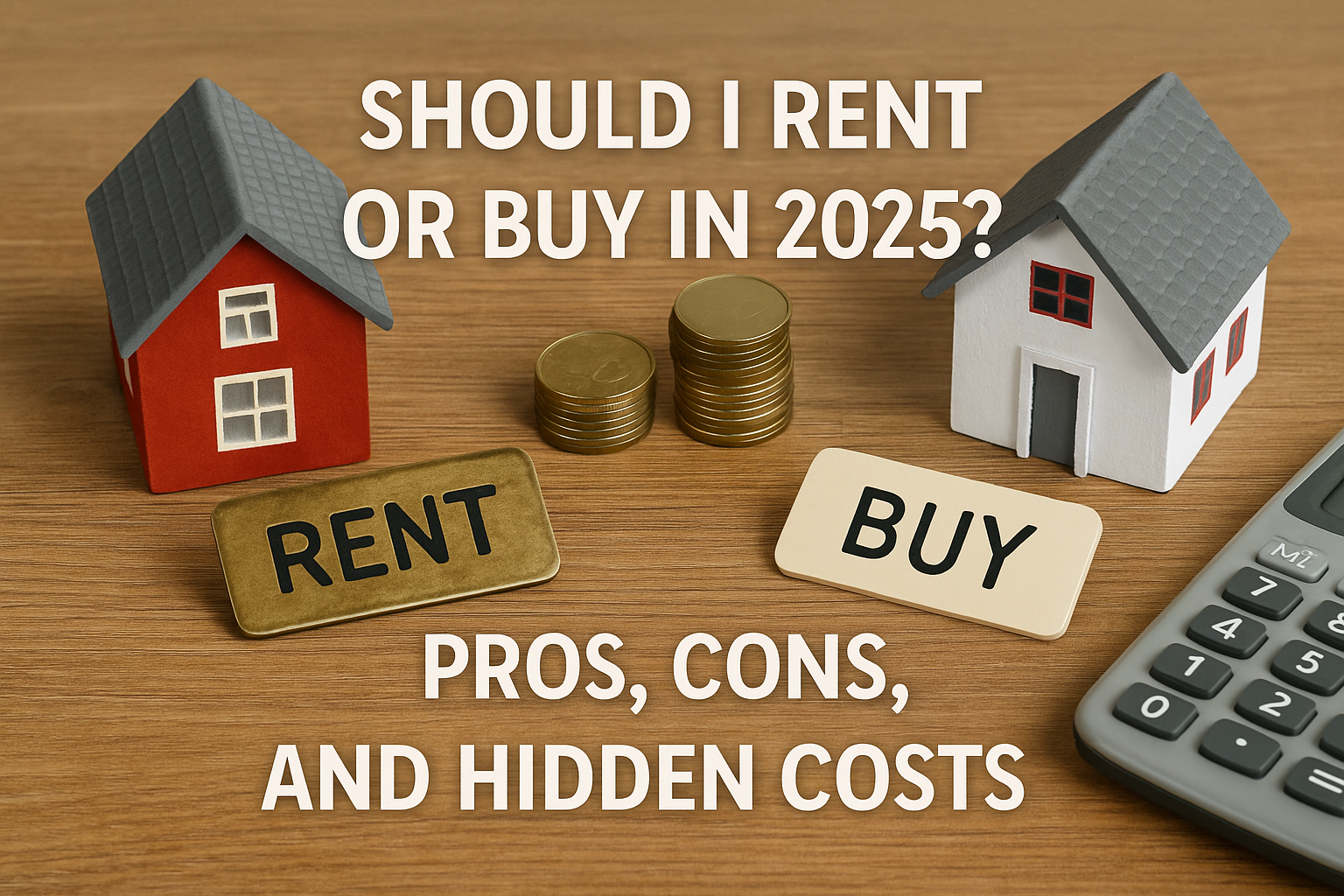Introduction
It’s one of the biggest financial questions you’ll ever face: Should I rent or should I buy a home? In 2025, with rising interest rates, fluctuating housing prices, and a shifting job market, the decision is more complex than ever. But don’t worry—we’re here to break it down in plain language.
This guide explores the pros, cons, and hidden costs of both renting and buying so you can make the smartest choice based on your life, not someone else’s timeline.
1. The State of the Housing Market in 2025
Before diving in, let’s look at the current landscape:
- Mortgage interest rates in 2025 hover between 6% and 7.5%, depending on credit score and location.
- Home prices have leveled off in some areas but remain high in urban centers.
- Rental demand continues to rise, especially in cities with tech or health industries.
- First-time buyers are struggling with down payments and debt-to-income ratios.
So the answer isn’t clear-cut—it depends on your financial readiness, lifestyle, and long-term goals.
2. The Case for Renting
Pros:
- Flexibility: Move easily for jobs, school, or lifestyle changes
- Lower upfront costs: Security deposit vs. down payment and closing costs
- No maintenance costs: Landlords handle repairs and upkeep
- Predictable monthly expenses: No surprise HVAC breakdowns or property tax increases
Cons:
- No equity building: Rent payments don’t turn into ownership
- Rent increases: You’re at the mercy of the landlord or market
- Limited customization: You can’t renovate or personalize much
Best for:
- People who plan to move within 1–3 years
- Those with unstable income or job transitions
- Anyone saving aggressively for a future home
3. The Case for Buying
Pros:
- Equity growth: Each mortgage payment increases your ownership
- Stability: Fixed-rate mortgages mean steady housing costs
- Tax benefits: Mortgage interest and property taxes may be deductible
- Freedom to modify: Renovate, decorate, or build your dream kitchen
Cons:
- High upfront costs: Down payment, closing costs, inspections
- Maintenance responsibility: You pay for all repairs—planned or not
- Less mobility: Selling a home takes time and costs money
- Market risk: Property values can fall, not just rise
Best for:
- People ready to stay put for 5+ years
- Those with stable income and savings
- Families or individuals wanting long-term roots
4. Let’s Talk Numbers: Hidden Costs on Both Sides
Renting
- Application fees
- Pet deposits
- Moving costs
- Renters insurance
- Utility setup fees
Buying
- Down payment (typically 3%–20% of home price)
- Closing costs (2%–5%)
- Property taxes (varies widely by location)
- Homeowners insurance
- Private mortgage insurance (PMI) if <20% down
- Repairs and maintenance (average $3,000–$5,000/year)
5. Affordability: Can You Actually Buy?
Before dreaming of homeownership, run the math.
Rule of thumb:
- Your housing costs (mortgage + taxes + insurance) should be <30% of your gross income.
- You’ll need a credit score of 620+ for most mortgages.
- Save 3%–6% for down payment, plus buffer for closing and emergencies.
Use calculators like NerdWallet or Bankrate to test scenarios.
6. Lifestyle and Life Stage Matter
Ask yourself:
- Will I stay in this city for at least 5 years?
- Am I willing to handle home repairs or renovations?
- Do I prefer flexibility or stability right now?
- How’s my job security?
Renting or buying isn’t just a financial decision—it’s also about how you want to live.
7. Hybrid Options to Consider
- Rent-to-own: Lease with the option to buy later
- Co-living or house hacking: Rent out part of the home you buy
- Shared equity programs: Lower entry costs for first-time buyers
These in-between paths may offer the best of both worlds.
Final Thoughts: There’s No One-Size-Fits-All
The best housing decision is the one that aligns with your goals, budget, and lifestyle—not what friends or Instagram influencers are doing.
In short:
- Rent if you value flexibility or are still building financial stability
- Buy if you’re ready for responsibility, commitment, and long-term growth
2025 may be uncertain, but with a clear view of your priorities, you can make a housing decision that feels not just smart—but right.
